 Petzlover
Petzlover Beauceron is originated from France but Japanese Spitz is originated from Japan. Beauceron may grow 37 cm / 15 inches higher than Japanese Spitz. Beauceron may weigh 40 kg / 89 pounds more than Japanese Spitz. Both Beauceron and Japanese Spitz has almost same life span. Both Beauceron and Japanese Spitz has almost same litter size. Both Beauceron and Japanese Spitz requires Low Maintenance.
Beauceron is originated from France but Japanese Spitz is originated from Japan. Beauceron may grow 37 cm / 15 inches higher than Japanese Spitz. Beauceron may weigh 40 kg / 89 pounds more than Japanese Spitz. Both Beauceron and Japanese Spitz has almost same life span. Both Beauceron and Japanese Spitz has almost same litter size. Both Beauceron and Japanese Spitz requires Low Maintenance.
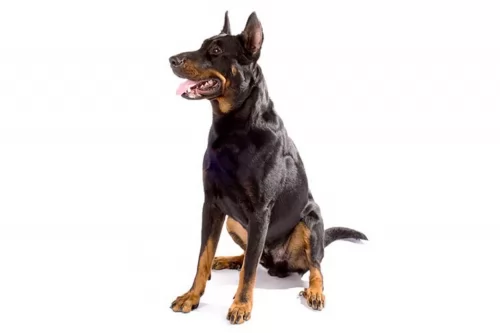 Sometimes referred to as the king of sheepdogs, the Beauceron is a French dog breed that happens to be an extraordinary herding dog too. He instinctively rounds up livestock without even being trained to do so. The dog is also known as Berger de Beauce, originating from the Beauce region in France and is closely related to the Briard or Berger de Brie.
Sometimes referred to as the king of sheepdogs, the Beauceron is a French dog breed that happens to be an extraordinary herding dog too. He instinctively rounds up livestock without even being trained to do so. The dog is also known as Berger de Beauce, originating from the Beauce region in France and is closely related to the Briard or Berger de Brie.
This French breed’s origin goes back to the late 16th century, and the Beauceron was divided into two working types way back in 1863 - the dog with the long coat was known as Berger de Brie or Briard while the short-coated dog became known as Beauceron. It was in 1922 that a club for this dog breed was established, and the Beauceron Club of America was established in 1980, only recently receiving recognition by the American Kennel Club.
 Spitz dogs include quite a few dog breeds and these dogs all have similar characteristics – pointed, erect ears, slanted type eyes with thick fur.
Spitz dogs include quite a few dog breeds and these dogs all have similar characteristics – pointed, erect ears, slanted type eyes with thick fur.
The Japanese Spitz was developed by Japanese breeders at the time of the 1920s, and bringing in quite a number of dog breeds to do so. The breeders started with the white German Spitz dogs but later other white Spitz breeds were imported and crossed into this developing breed.
The final standard for the breed after World War 11 was accepted by the Japan Kennel Club. The dog became recognized by other kennel clubs of the world.
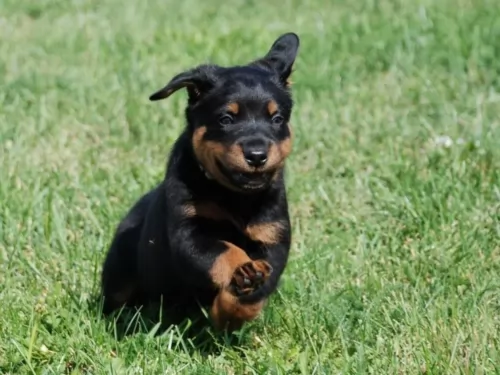 The Beauceron is an intelligent dog, just by looking at the alert, bright face. He is a muscular, large dog breed, standing up to 71cm in height and weighing in at up to 50kg. You’ll recognize him with his dark black coat with red markings, particularly around the feet, which interestingly gives this breed the French nickname Bas Rouge. It means red stockings. Harlequin, tri-coloured grey, black and tan is also recognized as a color.
The Beauceron is an intelligent dog, just by looking at the alert, bright face. He is a muscular, large dog breed, standing up to 71cm in height and weighing in at up to 50kg. You’ll recognize him with his dark black coat with red markings, particularly around the feet, which interestingly gives this breed the French nickname Bas Rouge. It means red stockings. Harlequin, tri-coloured grey, black and tan is also recognized as a color.
The coat is rough, short and dense, the alert eyes dark brown and the ears are set high and can be cropped or natural. The natural ears are half pricked or drop ears and are fairly short. Looking similar to the Doberman and Rottweiler but with a long tail, this French Shepherd dog is somewhat slimmer but with a foreboding appearance. He is solid, well proportioned and well muscled and gives the impression of strength. He has a tolerant nature and will fit in well with a family when trained and socialized.
 The Japanese Spitz is a small to medium sized dog, being somewhat larger than the Pomeranian. The dog stands at 25 – 38cm, both male and female and weighs anything between 5 to 10kg.
The Japanese Spitz is a small to medium sized dog, being somewhat larger than the Pomeranian. The dog stands at 25 – 38cm, both male and female and weighs anything between 5 to 10kg.
The double coat of the dog is thick and white and the puppies look like large snowball.s He has a pointed muzzle with erect ears and a tail that curls up over the back.
The pure-bred Japanese Spitz, just like other Spitz dogs are smart, inquisitive dogs who show loyalty to their owners, getting on well with children in the home and making a good family pet.
They can be quite stubborn, so training and socialization becomes important if you want him to be obedient. Training is easy as he is an intelligent, bright little dog.
They’re able to adapt to life in the city or in the country, but if you live in the city, you will need to meet his exercise needs.
He can tolerate cold weather quite well but as a companion dog, he prefers being indoors with his human family.
Even though they are small dogs, they are protective and make good watchdogs. They were bred to be companion dogs and they take this role seriously, being loyal, entertaining, fun, friendly and loving with their human family.
It is why they are becoming such a popular breed as they have an amicable nature, getting on well with other pets as well as children.
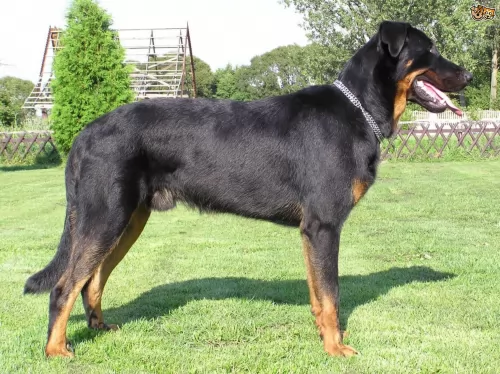 Strong, big, confident and good-looking the Beauceron makes an excellent watchdog, guarding the human family that he is so devoted too. He is a good friend and companion and is tolerant with children and other pets.
Strong, big, confident and good-looking the Beauceron makes an excellent watchdog, guarding the human family that he is so devoted too. He is a good friend and companion and is tolerant with children and other pets.
He is such a clever breed too, and its small wonder that he has always been sought after for hard work – herding, shepherding and even rescue work. When he’s not involved in working, at home, he’s just your big, devoted friend.
 Your Japanese Spitz is going to make you a superb companion and you want to ensure that you are well prepared for him when he arrives. He is feisty, charming, social, bright, alert, active, loyal and loving and you want to be sure that he has everything laid on as a 4-legged family member.
Your Japanese Spitz is going to make you a superb companion and you want to ensure that you are well prepared for him when he arrives. He is feisty, charming, social, bright, alert, active, loyal and loving and you want to be sure that he has everything laid on as a 4-legged family member.
He isn't a high maintenance dog, he isn't demanding and if you love and care for him, you'll find that he fills a vacancy in your life that you'll never want to be without again.
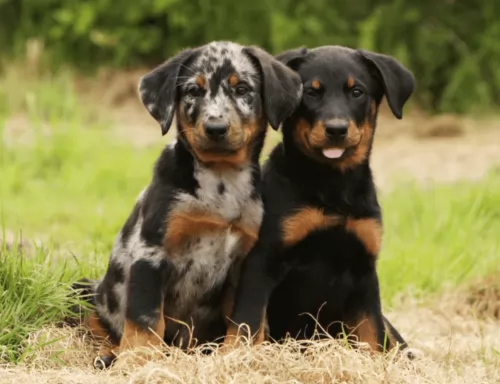 It’s such a nice strong, good-looking dog this, you can’t think of anything going wrong with him. His lifespan is anything from 10 to 14 years and the dog is pretty robust. Being a large breed and a pedigree, he is prone to some common ailments. When you suspect your beloved pet has any health issue, don’t hesitate to get him to the vet.
It’s such a nice strong, good-looking dog this, you can’t think of anything going wrong with him. His lifespan is anything from 10 to 14 years and the dog is pretty robust. Being a large breed and a pedigree, he is prone to some common ailments. When you suspect your beloved pet has any health issue, don’t hesitate to get him to the vet.
A painful disorder that affects larger dogs and brought about by an abnormal development in the joints.
Also a painful condition where the stomach twists so that the blood supply is cut off. Large breeds with deep chests are more prone to developing the condition. Rapid breathing and signs of pain can be indicative of this ailment.
 Life expectancy for the Japanese Spitz is about 10–16 years. They are a healthy breed with few genetic problems. Nothing is set in stone though, and your healthy dog can fall prey to some of the many common dog illnesses there are.
Life expectancy for the Japanese Spitz is about 10–16 years. They are a healthy breed with few genetic problems. Nothing is set in stone though, and your healthy dog can fall prey to some of the many common dog illnesses there are.
They're so sweet, you're tempted to feed him treats all the time, but obesity is a common Japanese Spitz health issue and obesity can lead to many problems with the heart, kidney, diabetes and even joint pain.
Also, eye problems such as ingrown eyelashes and a lower eyelid that rolls inward are problems that are known to trouble these Spitz type dogs. It leads to terrible irritation and damage to the eye. It's definitely time to see the vet to avoid infections and injury.
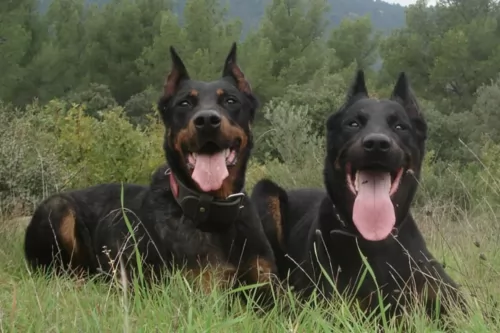 This is a large, hard-working, energetic dog and he will need high-quality food, whether commercially manufactured or home-prepared. The best commercially manufactured dog foods produce foods with the right balance of minerals and vitamins in keeping with your dog’s age, his activities and his stage of life (illness, senior, puppy). If you’re unsure about what to feed your Beauceron, speak to your vet to be 100% that you are meeting his nutritional demands, and always ensure a bowl of cool, clean water is constantly available.
This is a large, hard-working, energetic dog and he will need high-quality food, whether commercially manufactured or home-prepared. The best commercially manufactured dog foods produce foods with the right balance of minerals and vitamins in keeping with your dog’s age, his activities and his stage of life (illness, senior, puppy). If you’re unsure about what to feed your Beauceron, speak to your vet to be 100% that you are meeting his nutritional demands, and always ensure a bowl of cool, clean water is constantly available.
You’re lucky with the Beauceron as he is a low shedding, low maintenance dog with his short coat. He doesn’t require any trimming but will need a good brush twice a week to rid him of loose hairs. Clean his teeth with a special dog toothbrush and toothpaste to avoid plaque buildup. Never use human toothpaste. Clip his nails if he doesn’t wear them down naturally.
This is a big, strong, energetic dog, and you owe it to him to ensure he gets lots of exercise – runs, walks and ball games. If you can’t be a responsible dog owner, don’t own a breed like this as he can become destructive if not kept active.
 The Japanese Spitz is an active dog and he will require at least one walk a day to keep him happy. He is full of beans and wants to go with you on all your outings.
The Japanese Spitz is an active dog and he will require at least one walk a day to keep him happy. He is full of beans and wants to go with you on all your outings.
The diet of your Japanese Spitz is basic to his good health. If you feed him low quality foods deplete of vitamins and minerals, you'll end up with a sick dog who is always at the vet. Puppies need 4 small meals a day while an adult dog can have 1 or 2 meals a day.
He can benefit from the top quality commercially manufactured foods and sometimes you can add in some cooked chicken, rice and vegetables into his dry kibble. Add in a little bit of raw meat too from time to time and ensure that he can always reach his bowl of fresh, cool water.
The beautiful white fur of your Japanese Spitz will need to be brushed at least twice a week to keep it free from loose hair and to keep the fur bright and vibrant.
Check his nails and avoid them getting too long as they can hook on things and cause injury. Check his ears inside and out, keeping them clean and free of debris. Very importantly, keep his teeth clean as dental disease can play havoc with a dog's health.